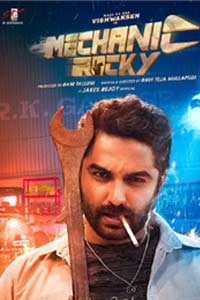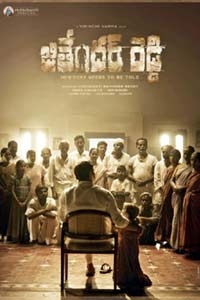
If you watch Kadali with a silent mind, it is sure to immerse you in the spiritual ocean at a few places. Without setting forth to break new ground, Mani Ratnam delivers a film with invaluable moments of a rare kind. Whether or not most of them recognize today, Kadali will sure be seen (say, after 10 years) as one of the finest masterpieces of Mani.
Even the most intelligent Telugu director must be green with envy at a good Tamil director's knack for unleashing a mix of scorching and ennobling emotions in the framework of one film. In Kadali, the well-etched characters exude a range of expressions, their body language has no trace of artificiality, the dialogues are immensely realistic (and subtly expressive in some crucial scenes).
Imagine a story premised on four unusual characters (for Indian cinema) and all of which together make a fantastic cinematic story - a rich man who renounces all his wealth in search of service to Jesus Christ, a poor man who grows to be a womanizing church teacher, a youngster who lives in frustration over losing his mother to a lecher's sexual atavism and being constantly rejected by the biological father, a sinless (rather sin-naive) girl who would have been a medical genius had she not been forced by circumstances to remain child-like. A story with immense potential would have been wasted if it were not for an efficient, imaginative mind like Mani.
At a time when even the biggest of Mani's fans have become a bit skeptical, he has come out with a film which is dramatic, weaving sophisticated scenes on the basis of a beautiful story (by Jaya Mohan). The pace is engaging in the first half, and though it seems to be sluggish for some time in the second half, the drawback is made good by a few heart-touching (and also heart-rending) moments here and there.
Arvind Swamy (as Sam) plays a rich man who has chosen the path of religious life, dedicating himself to spreading the message of his God. After exposing Arjun's (as Bergson) sinful activity in the church, he arrives at a place on the shores of a sea. The village is almost a hamlet, where the so-called believers never visit the local church and they are foolish enough to say that they will teach lessons in religion to the Father if he allows them. Renovating the church all by himself, Sam takes God to the reluctant villagers. He earns their respect and awe soon.
He develops a special bond with Thomas, a teenage boy whose father has disowned him because he is his illegitimate offspring. He lives with memories of his dead mother. To such a person who has never been loved after his mother's death, Sam gives him everything, including love. He teaches him how to pray, how to play.
There comes a poignant twist in the tale when past catches up with Sam in the form of Arjun. What consequences does it lead to? How does it change the course of the lives of Sam and Thomas?
There are many scenes which stand out for their sheer intelligence and the intensity of emotions they concoct. They contain in them either magic, melancholy, raw realism or an implicit message. They are haunting.
1. The scene before the titles in which we see the child Thomas shedding no tear at his mother's brutal death as he does not understand what death is like. Once before her death, and later after that, he lies on her chest trying to listen to her heart-beat. When he starts to weep seeing his mother's leg being broken to be able to fit the proverbial Procrustean bed, it is grating.
2. Years later, Thomas wails out of heart while recording on a radio for the Father Sam.
3. Arvind Swamy's masterly act in the scene where Lakshmi Manchu is questioned in the church.
4. The scene where Thomas says 'Stotram' to Christ's statue, which had been made by Sam, after he introduces his girlfriend (Priya) to Sam.
5. It is followed by the scene where Priya, after listening to Thomas' voice (described in Point 2) cries hugging him.
6. The scene where, after conducing delivery for a women along with Priya, Thomas seems to feel spiritual love looking at the blood stains of the baby on his palms. It feels as though Mani wanted to convey that Thomas just had a new birth.
7. The scene where Karthika expresses ignorance about what sin means.
8. Thomas' reaction to the killing of his biological father.
9. The last scene at the end of which Sam says to Thomas, "You are greater than me." With a goddess in heart, how can he seek revenge? This scene is inherent in the story.
In a long time, we see a real story that is capped with a superb narration. Arjun's Saitain's game versus Arvind Swamy's divine mission, with the hero at the centre of their projects, is great. The entire romance track is a treat to watch, with most of it told in songs.
The dialogues are a big plus. Sri Ramakrishna's dubbed lines are usually good. They capture the moods and ideology of the characters without being verbose or unnecessarily exaggerated.
In spite of the fact that it presented so many rare and moving situations (a la Roja, Bombay and Amrutha), AR Rehman delivers a so-so BG score, the lack of a hair-raising score is felt at umpteen places. Vanamali's lyrics are not clearly heard and the tunes themselves are not memorable. The visuals are a treat though, thanks to Rajiv Menon's marvelous camera work.
Performances are mature. Arvind's stands out for its maturity and subtlety. If his eyes convey an emotion in each scene, his serene smile and face make him look the character every bit. Arjun looks a bit off-colour but he too fits the bill, delivering a baddy's act in an uncharacteristically subdued fashion. though skinny, passes muster. The heroine has a cute smile but we should wait for her acting prowess to come to the fore.
Verdict: With a beautiful story and an imaginative screenplay, Kadali is a breathtaking film topped with fine performances which convey a range of emotions; the film weaves a number of immensely watchable scenes.
Rating: 0 / 5.0
Showcase your talent to millions!!
Telugu Movie Reviews
 Devaki Nandana Vasudeva
Devaki Nandana Vasudeva
 Zebra
Zebra
 Mechanic Rocky
Mechanic Rocky
 Matka
Matka
 Kanguva
Kanguva
 Jithender Reddy
Jithender Reddy




Comments